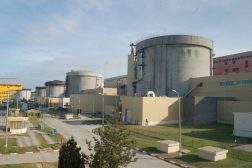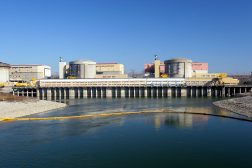Press release
Nuclearelectrica announces that it has obtained financing from the EIB for the Tritium Removal Facility Project (CTRF)
Bucharest, December 22nd, 2023
Societatea Nationala Nuclearelectrica SA (Nuclearelectrica) and The European Investment Bank (EIB) have signed a loan agreement of €145 million to support the completion of Europe’s first Tritium Removal Facility (CTRF) at Cernavoda Nuclear Power Plant (Cernavoda NPP). The CTRF will remove the tritium from reactor’s coolant and moderator (heavy water), leading to increased protection of the environment, public and employees’ occupational health and safety, in full alignment with Nuclearelectrica’s and Europe’s ESG objectives.
The project will enhance radiation safety of the power plant, further reduce the volume of radioactive wastes, prioritising the well-being of the workers and allowing for the coolant and moderator (heavy water) to be re-used, after tritium removal. Successful completion of the project will allow for regular maintenance, refurbishments, and eventually decommissioning to be undertaken more easily, safely and efficiently.
Cosmin Ghiță, Chief Executive Officer of Nuclearelectrica, added: “This project is part of our investment plan that will bring the developments in the nuclear sector in line with national energy policy, as outlined by the government. Using a Romanian innovative technology, developed by the Romanian National Research and Development Institute for Cryogenic and Isotopic Separation Technologies (ICSI Rm. Valcea), Cernavoda Tritium Removal Facility (CTRF) will be the world’s third and Europe’s first Tritium Removal Facility and will give Romania the opportunity to become a European hub for tritium production and export – the fuel candidate of future clean fusion reactors. We are happy to implement a Romanian innovative technology, based on years of research and development, a true statement of Romania’s leadership in nuclear industry.”
“The EIB is financing sustainable energy projects worldwide and we are glad to support this project with health, safety and circular economy benefits undertaken by an experienced promoter.” said EIB Vice-President Kyriacos Kakouris.
The EIB’s approach to nuclear projects was defined in its Energy Lending Criteria 2013 and has remained unchanged since. The Bank adopts a technology neutral approach in line with the European Union’s decarbonisation goal and the objectives of ensuring security of energy supply and competitiveness in an environmentally sustainable, cost-efficient, effective, safe and socially acceptable way.
About Nuclearelectrica
The national company “Nuclearelectrica” SA is the Romanian national electricity, heat and nuclear fuel company operating under the authority of the Ministry of Energy, with the Romanian state holding 82.49% of the shares and the other shareholders 17.50%, after the listing of the company on the stock exchange in 2013.
The Cernavoda CNE (CNE) branch operates two CANDU nuclear units, which are two of the most efficient units among more than 400 nuclear power plants in the world, a nuclear fuel plant and is in the process of building an integrated fuel cycle through the acquisition of a uranium concentrate processing line to support the company’s long-term investment projects.
Nuclearelectrica plays a major role at national level, contributing more than 18% of nuclear energy to total energy production and 33% of total CO2-free energy production in Romania.
About EIB
The EIB is the long-term lending institution of the European Union, owned by the Member States. It makes long-term finance available for sound investment to pursue EU policy goals. The EIB has been active in Romania since the early 1990s. Through 180 projects worth €17.78 billion to date, it has improved regional cohesion, infrastructure and healthcare services, and supported SMEs.










